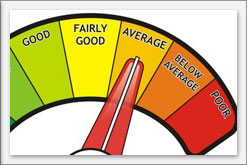
Your credit rating is important. If it is good then you will find it easier to borrow. If it is poor you will struggle to get credit and the costs will increase.
Jump to article content:
Need advice about Debt? Give us a call on 0800 077 6180 or complete the form below to speak to one of our experts
What is your Credit Rating?
Your credit rating (sometimes known as your credit score) is the phrase used to describe your credit worthiness. In other words how likely you are to pay back money if someone lends it to you.
Although it is a commonly used term there is actually no central credit rating scale. In reality each lender compares information about you (available in your credit file and from other sources) to their own specific lending criteria. They then make a decision whether to lend to you or not.
Your credit file is a summary of all the credit you have taken and your repayment history for each account. The information is complied and managed by three main credit reference agencies. If you access your file you will see that they assign you a credit rating or score (normally out of 100). The closer to 100 you get the better they believe your credit worthiness is.
Your credit score is a number assigned to you by the credit rating agencies. It does not necessarily reflect whether you will be able to get credit from a specific lender or not.
What makes your credit rating worse?
Your credit rating will become worse if you miss repayments on any credit agreements you have in place. Generally speaking if you miss a single payment but then catch it up straight away your credit will not be affected.
However if you continue to miss payments anyone checking your file will see this and become concerned. As a result they will be less likely to lend to you.
Your rating will also be negatively affected if you start a debt solution.A formal solution such as an IVA will be recorded on your credit file for 6 years. You are unlikely to get more credit easily during this time. A debt management plan will usually have a negative impact until your debts are paid or settled.
Your repayment history is NOT the only criteria used by potential lenders when making a decision about whether to lend to you. They also use additional criteria such as how long you have lived in your current accommodation and whether you are registered on the electoral role.
How to improve your credit score
You may have had credit problems or have used a debt management solution in the past. Alternatively you may never have had credit before. This may also restrict your ability to borrow.
There are certain actions that you can take make your credit rating better. The best is to start using credit. This may sound obvious. But starting to build up a history of responsible credit usage and repayment is key to getting a top credit score.
So how do you do it? A simple way is to use a so called credit repair credit card. There are a number of lenders who will offer this facility if you have a poor or limited credit score. Make sure you pay the balance in full at the end of the month and this will improve your credit rating no end.
If you have used an IVA (or gone bankrupt) you can start to build up your credit as soon as it is over. However your credit rating will never be 100% repaired until the record has come off your credit file after 6 years.
Arrange a call with a Debt Management Expert
Privacy Policy
Your information will be held in strictest confidence and used to contact you by our internal team only. We will never share your details with any third party without your permission.

